Los Angeles City Council Delays Vote On $31 Million Body Camera, Stun Gun Contract
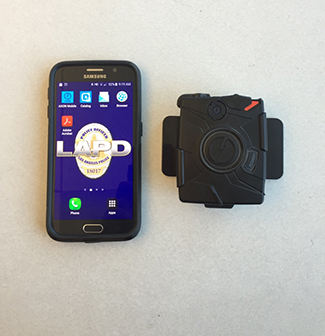
The Los Angeles City Council delayed a vote Wednesday on a five-year, $31 million contract between the Los Angeles Police Department and Taser International Inc., for 6,140 body cameras and 4,400 Tasers. The vote was delayed after some council members raised concerns about additional staffing costs mentioned in the request.
City Council President Herb Wesson delayed the scheduled council vote. Vanessa Rodriguez, a spokeswoman for Wesson, said he wanted to give members time to “vet and scrutinize” the proposed multimillion dollar contract.
In a Dec. 16 letter to the Los Angeles Times, LAPD Chief Charlie Beck and Police Commission President Matthew Johnson urged the City Council to fund body-worn video “without delay.”
“The implementation of these cameras allows a window into the use of that power and authority that will assist in ensuring accountability and also improve behavior on both sides of the camera lens,” Beck and Johnson wrote.
The contract will likely be considered by the City Council again in early 2016.
The department estimates that the body camera program will cost $57.6 million in the first five years. This includes the $31 million Taser contract along with the costs of additional equipment and employee salaries. The proposed contract allocates funds for Taser Axon body cameras, replacements and upgrades. It also requests approval to cover the costs of cell phones, storage, docking stations, accessories, maintenance and support.
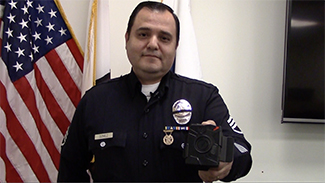
Officials say one of the unit’s responsibilities would be to travel to the crime scene of an officer-involved shooting to assist with the upload and review of video.
The body cameras proposed for purchase are estimated to cost a little over $10 million in the first year, but the city has only allocated $4.5 million from the budget. City Council approval is needed before the funds can be appropriated. The LAPD also received $1 million in federal funds to purchase body-worn cameras and train officers in their use on Sept. 21. The grant was one of 73 awarded by the Department of Justice’s Office of Justice Programs. However, the source of the remaining funds is unclear.
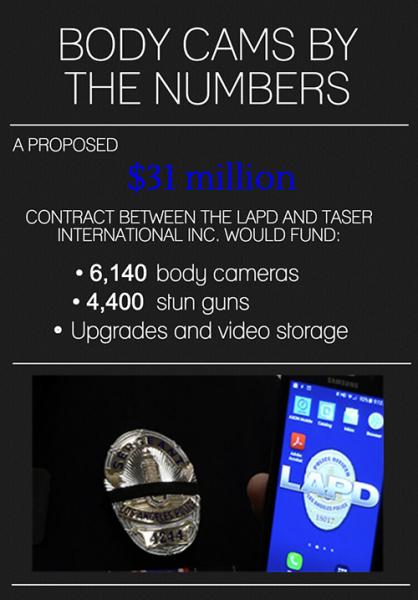
The department began equipping its officers with chest-mounted cameras on Aug. 31. The city-wide body camera program is expected to consist of 7,000 cameras total, ensuring that all officers on the street are outfitted with the new technology.
The first batch of cameras – totaling 860 – cost $1.5 million dollars. This was paid for by private donations raised by Police Commission Vice President Steve Soboroff.
Over the years, mistrust of the LAPD has marinated in certain communities due to violence and corruption allegations such as the Rodney King case and the Rampart scandal.
Mayor Eric Garcetti has been vocal in expressing his support for the devices.
“These cameras will help law enforcement and the public alike find the truth – and truth is essential to the trust between the LAPD and the community, which has been a key factor in lowering crime to record lows," Garcetti said in a 2014 press release.
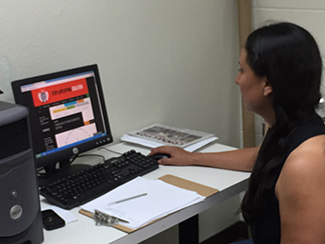
The LAPD’s body cam program is on track to become the largest in the country during a time of national debate on race relations and police brutality. But, not everyone’s on board with the program.
Jamie Garcia, a Boyle Heights nurse and member of the Stop LAPD Spying Coalition, says that body cameras will only increase surveillance of the community.
“It’s a futile reform that won’t end the impunity of law enforcement,” Garcia said.
The coalition is a group that rallies against LAPD “spying and intelligence gathering.” The coordinator of the coalition Hamid Khan described body cameras as a “tool to expose the surveillance state” at a November Police Commission meeting. He added that the department’s body camera program is “flawed by design.”
Body-worn cameras shoot footage of an altercation from the officer’s point of view. The equipment is worn on the outside of an officer’s uniform and typically consists of a body-mounted camera with a built-in microphone and a handheld viewing device. The Stop LAPD Spying Coalition is completely against body cameras for surveillance and privacy reasons.
Another group, the American Civil Liberties Union of Southern California, originally backed the body cam proposal, but later asked the DOJ to withhold funding from the LAPD for the technology.
In an 11-page letter sent to the Justice Department on Sept. 3, Peter Bibring, the director of police practices and senior staff attorney at the ACLU, wrote: “We believe that LAPD’s policy does not promote — and in fact undermines — the goals of transparency, accountability and creation of public trust that body-worn cameras should serve.”
The ACLU of Southern California says it is willing to work with the LAPD on improving its “poor” policy for the cameras.
Hector Villagra, executive director of the ACLU of Southern California, issued a statement regarding the federal funding of the LAPD’s body camera program.
“We are extremely disappointed,” Villagra wrote in a Sept. 21 news release.
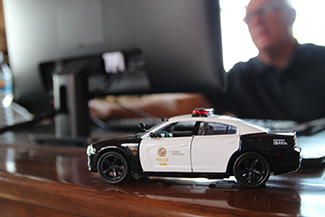
“Our policy is written in pencil, Soboroff said. “If there’s something we want to change … we’re going to review it in 6 months.”
Soboroff said he stands by the policy and maintains that the commission took all viewpoints into consideration before outlining the document.
Public access to body camera footage has become a point of contention between the LAPD and the ACLU.
The LAPD has said that it will not publicly release body camera footage unless it is required in a criminal or civil court proceeding. When asked about public access to the videos, Soboroff affirmed the LAPD’s stance, citing privacy concerns.
“What about the privacy of people? You’re catching people on their worst day,” Soboroff said.
The department’s policy states that while officers are encouraged to inform people that they are being recorded, they are not required to play back recordings to allow members of the public to review the video footage.
In the ACLU’s letter to the DOJ, Bibring wrote that the LAPD’s stated intention to withhold all body-worn camera footage absent a court order “utterly fails to promote transparency.”
“Body-worn video only provides transparency if the police release the videos,” Bibring added.
Garcetti spokeswoman Connie Llanos said the mayor understands the council’s need to deliberate the details of the contract and that he “looks forward to seeing this vote move quickly in the new year as we work to roll out cameras citywide in 2016.”
Reach Contributor Whitney Ashton here or follow her on Twitter here.



